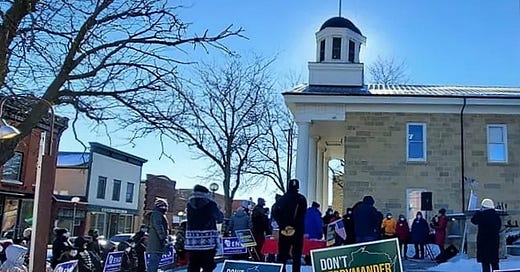What the Wisconsin Supreme Court’s redistricting ruling represents: Hope
The monumental decision by the court's new majority brings hope for a brighter future for all of Wisconsin.
The Recombobulation Area is a ten-time Milwaukee Press Club award-winning weekly opinion column and online publication written, edited and published by longtime Milwaukee journalist Dan Shafer. Learn more about it here.
Late on a Friday afternoon, at the beginning of a long holiday weekend, just days before Christmas, the Wisconsin Supreme Court delivered a long-sought ruling. The maps for the Wisconsin State Legislature — perhaps the most gerrymandered state legislative maps of any state in the country — were ruled unconstitutional.
This is a profound moment for the state of Wisconsin. These gerrymandered maps have warped politics in the state for the 12+ years they’ve been in place, creating outsized Republican majorities, unaccountable to the public and virtually impenetrable to any of the typical change that could typically be delivered by voters.
But it was the voters, the people of Wisconsin, who spoke loud and clear on April 4 when they wanted a change at the state’s highest court, the governing body capable of striking down these ridiculously unfair — and clearly unconstitutional — maps. The election of Justice Janet Protasiewicz (by a double-digit margin in a state that often decides its statewide elections by less than 1%) both symbolically and literally is a ground-shifting moment for Wisconsin politics.
If that election was the seismic shift, this ruling is the subsequent earthquake.
The fundamentals of governance in Wisconsin have been broken by Republicans since this egregious gerrymander came into place, and as it happens, a fundamental shift is what’s required to remedy this ongoing political travesty.
This fundamental shift, in this case, is to reset the maps. The game doesn’t function anymore, we need a new board — the other was tilted too far in one side’s favor, and was designed in violation of the rulebook.
There were a myriad of ways in which these maps could be challenged as unconstitutional, Jeff Mandell of Law Forward — the law firm that’s part of the group that filed lawsuit challenging the maps – told me in March in an interview for an in-depth feature story on gerrymandering in Wisconsin and the Wisconsin Supreme Court election. But it was the contiguity argument that ultimately struck the deciding blow in the case against the maps.
While right-wing Justice Rebecca Bradley bemoaned the decision, beginning her dissent by saying the liberal majority is “riding a Trojan horse named Contiguity” to make their decision, even Justice Brian Hagedorn, in his dissent, conceded that the claim on contiguity in the state constitution is “probably correct.”
At a late-November panel discussion on redistricting hosted by WisPolitics, Rick Esenberg of the Wisconsin Institute for Law and Liberty vociferously questioned the contiguity argument, but as Mandell responded on the panel, “What you didn’t hear from Rick and what you didn’t hear from anyone at the argument is that the maps are constitutional. Nobody’s willing to say it because they blatantly aren’t.” In short: Municipalities can and do have territorial islands; state legislative districts cannot, under the state constitution.
Less than a month later, in the majority’s ruling, Justice Jill Karofsky would write this: “In Wisconsin the number of state legislative districts containing territory completely disconnected from the rest of the district is striking. At least 50 of 99 assembly districts and at least 20 of 33 senate districts include separate, detached territory.”
She continued: “We hold that the contiguity requirements in Article IV, Sections 4 and 5 mean what they say: Wisconsin’s state legislative districts must be composed of physically adjoining territory. The constitutional text and our precedent support this common-sense interpretation of contiguity.”
As expected, Republicans in the legislature are now challenging this ruling. Their challenge took particular issue with the timeline — an initial Jan. 12 deadline to submit new maps — at one point writing, “it could require time for legislators to work across the aisle to try and override (the governor’s) veto. It is not something that can be rushed over Christmas and New Year holidays.” This is a pretty rich argument from a Republican majority that very rarely works across the aisle (because of the gerrymander, they often don’t have to), and spent all of 2020 as the least active full-time legislature in the nation (because of the gerrymander, they can avoid working entirely, lose seats, and still keep their majority).
We’ll see what, if anything, comes of this Republican challenge to the Wisconsin Supreme Court ruling, but more than an actionable challenge, it seems like more of a precursor to what they’ll eventually be bringing to the U.S. Supreme Court. Almost immediately after news of the 4-3 ruling striking down the maps broke, Republican Assembly Speaker Robin Vos tweeted that the “U.S. Supreme Court will have the last word.”
Legal experts cited by the Milwaukee Journal Sentinel in the wake of the maps being struck down have said such a U.S. Supreme Court ruling on the contiguity challenge is unlikely, given that it is an issue of the state’s constitution. Challenges focusing on Janet Protasiewicz and her involvement in the case also seem to not pass muster, given past SCOTUS decisions. But as we’ve seen, the U.S. Supreme Court as currently constructed can be unpredictable. It’s that very unpredictability that brings pause to this moment that should be genuine cause for celebration.
While it might not yet be time to spike the football in celebration of The Gerrymander’s demise just yet, we are indeed driving toward the end zone. The most likely outcome for what’s next is that these maps remain struck down, and new maps for the Assembly and Senate that better reflect Wisconsin’s electorate are in place by the 2024 election. The goal line is very much in sight.
Since this decision came down, we’ve seen all kinds of arguments on the right saying that all this court will do is instead gerrymander maps in favor of Democrats, an inverse of how the current maps favor Republicans. Not only would that be a mistake to take such an approach, that is not what’s happening in the least. More likely than not, given Wisconsin’s political geography, a more fair map would still mean Republicans will win a majority most of the time.
But not all of the time. That’s the difference.
The push for new maps is not about creating an unfair partisan advantage for Democrats in the Wisconsin State Legislature. Full stop. This is what those on the right who are blinded by binary of the D vs. R ramifications of this ruling fail to see. What this is really about is rebuilding the foundation of a system of how Wisconsinites are represented by their government, a foundation that has been broken and bludgeoned and disassembled for partisan gain through a style of governance that has put power consolidation above all else.
That’s the type of politics we need to get far away from. We need a legislature that works for all of Wisconsin. This decision takes one huge step closer to getting to a far better place, one where the will of the people is truly the law of the land.
What this monumental ruling from the new majority on the Wisconsin Supreme Court now ultimately represents then, is something palpable, formidable. Something worth fighting for.
What this represents is hope.
Dan Shafer is a journalist from Milwaukee who writes and publishes The Recombobulation Area. He’s also written for The New York Times, The Daily Beast, Heartland Signal, Belt Magazine, WisPolitics, and Milwaukee Record. He previously worked at Seattle Magazine, Seattle Business Magazine, the Milwaukee Business Journal, Milwaukee Magazine, and BizTimes Milwaukee. He’s won 17 Milwaukee Press Club Excellence in Journalism Awards. He’s on Twitter at @DanRShafer.
Subscribe to The Recombobulation newsletter here and follow us on Facebook and Instagram at @therecombobulationarea.
Already subscribe? Get a gift subscription for a friend!
Follow Dan Shafer on Twitter at @DanRShafer.







A concise and eloquent summation of this struggle. Thank you for your informed voice.
Thank you, Judge Janet and other fair-minded Wisconsin judges! Our nationwide volunteer work to help elect Judge Janet was well worth it to bring back justice on many matters. When we help fellow and neighboring states to overcome injustice, we benefit ourselves and our whole country. Here’s to people power rising ever higher to save our democracy and each other.